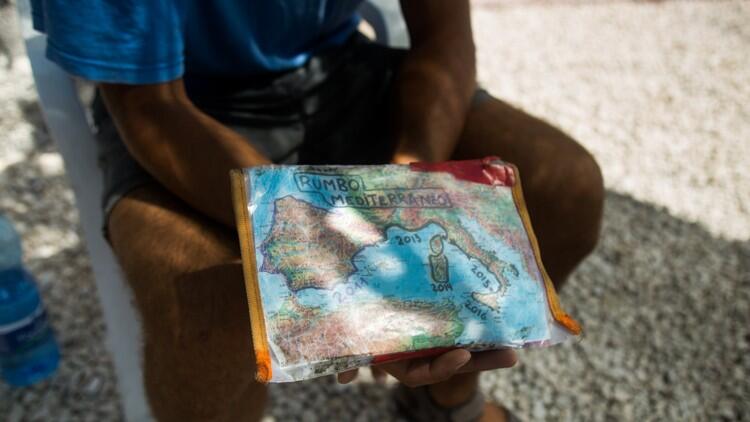As the kayak made its way just 20 feet from the rocky beach of Syracuse, Sicily, beachgoers lifted their heads to catch a glimpse. The first thing that stood out was the small dog perched on the back of the long, yellow kayak, a blue cloth hanging over her for shade. She lied with her head between her paws, relaxed, as if kayaking was a normal thing for a dog to do.
The second thing to catch our eyes — or mine, at least, having lived in Barcelona for almost a year — was the thick black letters across the kayak that read “Barcelona.”
“Did you come all the way here in that?” yelled my boyfriend in Catalan, the language spoken in Barcelona and the rest of the Catalonia region.
At the sound of that familiar language — rare words so far from home — Sergi Basoli whipped around. He docked his kayak; his dog didn’t waste time before jumping into the water.
Basoli, 33, has been making his way along the Mediterranean coast on a kayak since 2013, raising awareness for the protection and preservation of the sea. He spends eight months at a time on the road — or rather, at sea — going as far as he can with no particular plan in mind. Every December, he leaves his kayak at the nearest port to where he stopped and flies back to Barcelona. Once April or May rolls around, he flies back to where he last left his kayak and starts again from there. As of 2017, he’s traveled (paddled?) more than 3,000 miles.
It wasn’t until he kayaked along the entire Iberian Peninsula in 2011 that Basoli decided to pursue his dream of living an adventurous life. It was now or never: He was 27 years old and had just finished his master’s in engineering in Germany. So he saved up money, quit his job and took off in May 2013, to the protests and worries of many family members. His dog, Nirvana, joined him in 2014 when he found her in the streets of Sardinia.
So far, the pair haven’t looked back.
When we met up with him in Catania a week after our first encounter, just an hour north of Syracuse on the eastern coast of the island, he was getting around the city on a borrowed scooter — Nirvana always riding at his feet.
“I was just getting a tour of an ancient monastery,” he says as he took off his helmet, apologizing for arriving late. “Yesterday we even climbed Mount Etna,” he adds, referring to the smoking volcano looming over the city.
As soon as we sat down to eat granita, a Sicilian frozen dessert known as Italian ice in the United States, he apologized again — this time for having to answer some messages on Instagram. Basoli has a big social media following — his dog, no doubt, has a lot to do with it — with about 14,000 followers on both Facebook and Instagram. He uses it to spread his environmentally friendly message and to raise funds for his trips — for every $10 somebody donates, he cleans an entire beach. He says it’s a great way to incentivize people to take care of their beaches and oceans, but it can be exhausting.
“I decided to go on this adventure to unplug and be with nature, but I’m having to check in more than before,” says Basoli. He uses a solar-powered charger to keep his phone going.
“I had a sort of awakening in Germany about environmental issues,” he adds. “We’re destroying our planet. We need to ask ourselves, can we live with less? Can we be more minimalist?”
In 2013, he contacted various environmentally focused organizations to sponsor him on his trips — in exchange, he would carry their message across the Mediterranean. Oceana, an international nonprofit that works on ocean conservation, responded right away.
“He sends out great information, organizes talks at town halls,” says Ilaria Vielmini, marine scientist at Oceana’s Madrid office. She’s met with Basoli a few times since they first sponsored him. “Sometimes local governments take advantage of Sergi being there to spread this message.”
Through a number of campaigns, Oceana works to protect habitats that are at risk, particularly areas that suffer from overfishing. And it’s not just oceans they focus on — seas are also on that list.
“Trash is the most visible part of what we do, but a lot of times, we don’t see the damage we’re doing,” says Vielmini. “We need to see oceans as a resource.”
Basoli says he picks up trash constantly — the most bizarre thing he’s found is a plastic yogurt cup from 1970. He sometimes makes it a point to clean in front of others.
“When others see you picking up trash, it can awaken something in them,” he says. “The trash we’re throwing away today is trash that our grandchildren will still be dealing with.”
Basoli lives off of roughly €200, or $240, a month. He only pays for food and cell phone bills — sometimes he even fishes at sea, which he cooks on a homemade gas stove. At night, he camps at the beach or gets offered a place to stay. And for extra cash, he makes jewelry out of shells that he finds along the way — Nirvana wears one of these necklaces on a daily basis.
“It’s a simple day-to-day life,” says Basoli, who plans to continue his trip past Sicily and make his way up the eastern coast of the Italian peninsula. “I have a lot of faith and respect for the sea. It’s almost like a mystic connection.”
Source: https://atxne.ws/2mH1CDi











